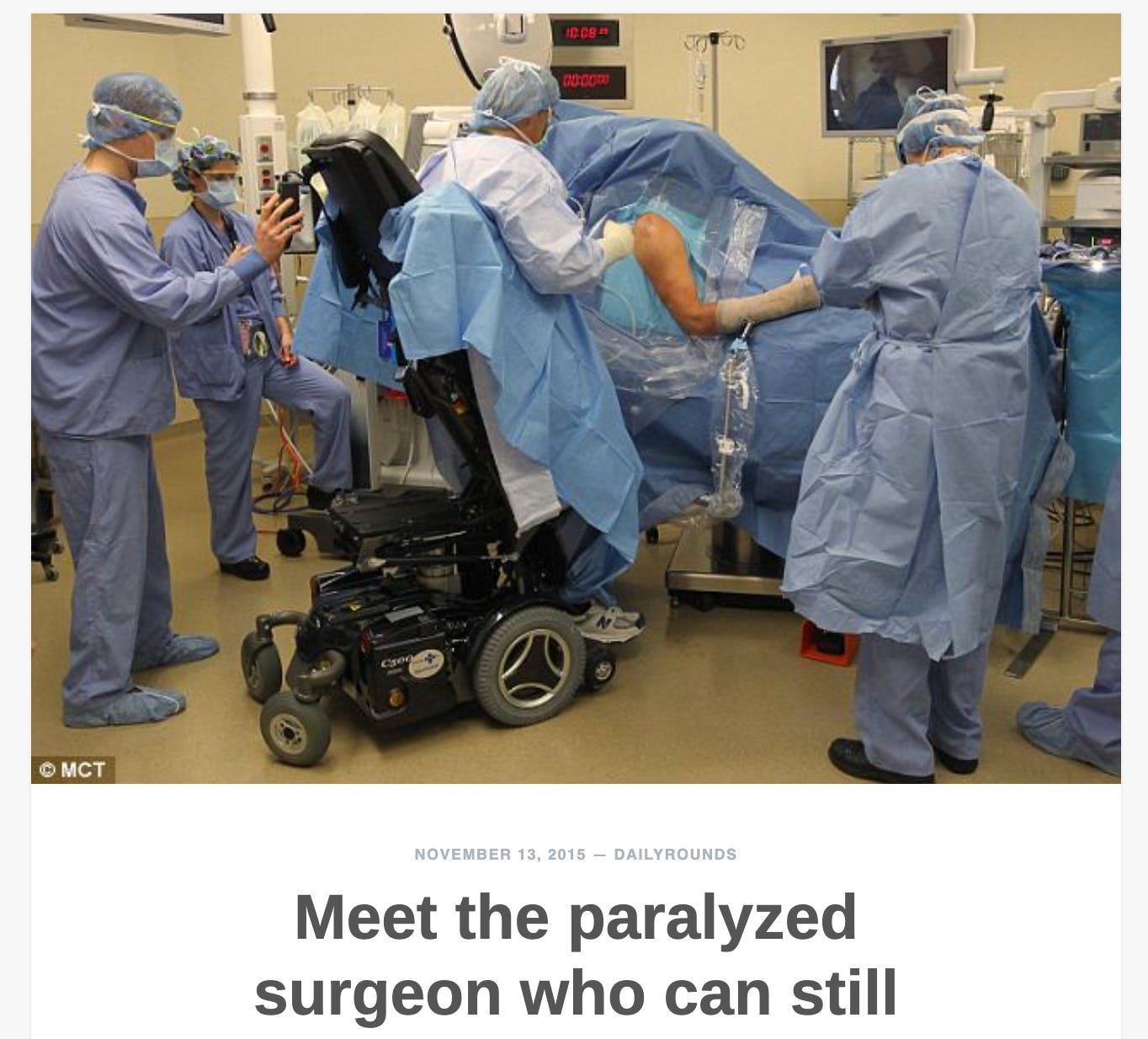Medical Student Accommodations
How much is too much?
Recently, I learned about a student on their clinical rotations who had to be sent home at precisely 9 hours. No matter how busy the day or service, the student would leave at the 9 hour mark. The reason? The student had a disability accommodation because he suffered from attention deficit hyperactivity disorder.
In medicine there is a tension. On the one hand, there is a basic amount of cognitive ability, physical function, maturity and character needed for the job. On the other hand, historically, medicine has been cruel and discriminatory to people with disabilities. I am a firm believer that someone who is paralyzed can be an oncologist (my job) or psychiatrist. At the same time, I struggle to see how such a person could run codes and work in trauma surgery. In one case, however, a heroic orthopedic surgeon still works after being paralyzed with the assistance of a stand up wheelchair, and I applaud him.
In the past, medicine has been too strict and unwilling to consider that people with disabilities can still become great doctors. At the same time, there is also the risk that easily applied clinical diagnoses allow students to evade the core and basic responsibilities of being a doctor.
I asked 15 doctors in training from around the world what they thought about the 9 hour work day. They all thought it was ridiculous that this exemption was granted, and worse that it was made using the provision for people with disabilities.
One raised the issue of character. Making this request reflected character that is not in line with the dedication needed to be a physician.
Another raised the issue of residency. What would happen then? Would other residents be burdened with picking up extra duties. How could the student complete a night shift?
Finally, one drew the distinction between the surgeon in the wheelchair and the student going home early. The surgeon wants to do the job in spite of all the challenges; The student wants the job to accommodate his desires.
In another example, a student came to rounds with a stool to sit down, while the rest of the team stood. This too was a sanctioned accommodation for fatigue. Meanwhile, the attending, a 70 something year old, stood. At least, in this case, the student’s accommodation does not directly impose on others. But what message does this send to the team? What happens when you walk and talk?
In this week’s Sensible Medicine podcast, I asked why students have an entire lecture with prolonged discussion of whether a patient coming to the hospital from prison should be called a prisoner. I strongly believe all patients — no matter where they come from — should be treated with respect, but spending limited class time debating the semantics seemed like a misuse of educational opportunity. There are so many things students are not learning instead — like how to read a paper or how to take care of heart failure (well).
In today’s example, students are being permitted more and more accommodations and even those that threaten the very core character and commitment needed to be a doctor. In both cases, who do I fault? The students?
No. I fault the administrators. Students are expected to have excuses, but the person who grants them is the problem. While I understand that schools will be reluctant to challenge the standing of a disability exemption, schools must. They should fire up their legal team and push back. If you can’t work more than 9 hours, then I am not sure any field of medicine suits you. Dermatologists, psychiatrists, and allergists all have busy days. All residencies run longer. One day, at the 8 hour and 45 minute mark, someone will walk in your office with crushing chest pain or difficulty breathing or feeling faint. Your answer cannot be to walk out.
The best people who go to medical school are better than the students I trained with (circa 2005-09). I don’t worry about the ambitious, kind, smart, and internally driven. The worst students were never fired when I was in training, and still aren’t fired today. But, when I trained, they faced bare minimum standards and were under pressure to improve — that has vanished.
I know we will have good doctors when I am older. There will always be good doctors. What I worry about is just how bad the bad ones will be? The worst-off people in society are likely to suffer disproportionately from doctors whose day ends at 9 hours no matter what. That scares me. What’s worse is that it is sanctioned by administrators who cannot be questioned.




There is also the lost opportunity cost. The student who can’t work beyond 9 hours took the place of a student who maybe had slightly worse grades but who would be dedicated and hard working. Medicine isn’t 9 hour shift work no matter what specialty is chosen.
To me, one of the most disappointing aspects of this is that it robs the student of the opportunity to develop self confidence and to find what they are capable of. I don’t think this can be understated. When I trained from 2009-2014 I didn’t think I could successfully manage a neurointensive care unit overnight by myself during a 30 hour shift. But looking back 10+ years later, these are the experiences that I remember and, more importantly, gave me the confidence and knowledge to handle other serious and complex situations. This is absolutely the administrators fault. They need to push back and realize they are not helping students by accommodating, they are actively harming them.